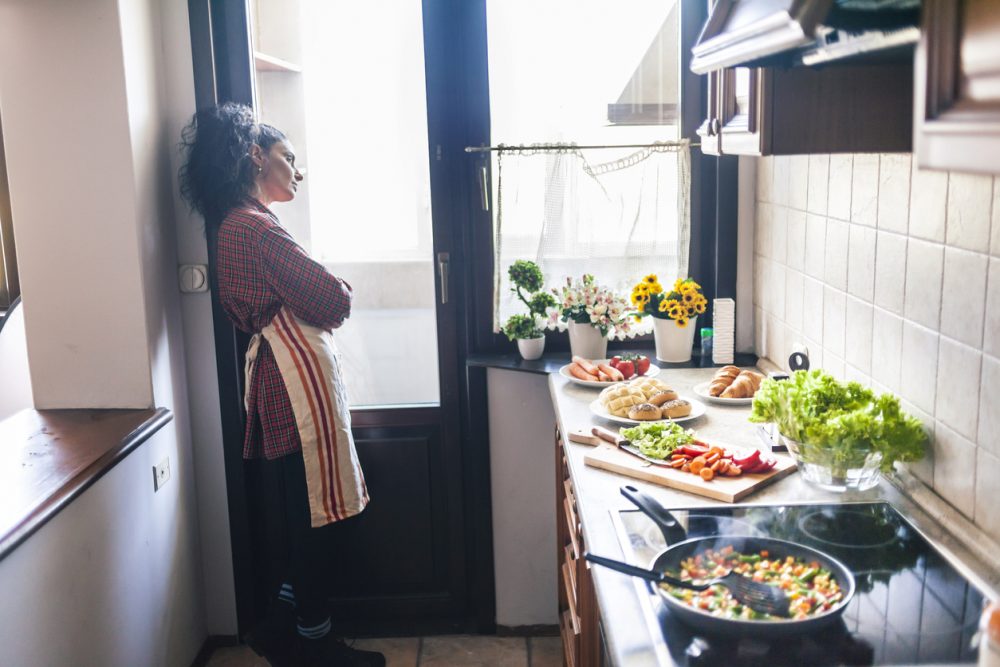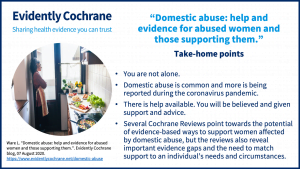In this blog for abused women and those who support them, former GP Lynda Ware looks at what domestic abuse is, at sources of help for women experiencing it, and at the evidence from three Cochrane Reviews looking at psychological therapies, advocacy interventions, and screening for abuse in healthcare settings.
Page last updated 15 June 2021 and last checked 26 June 2023.
Take-home points
You are not alone
Domestic abuse is common. The statistics show that in the year ending March 2019 in the UK an estimated 2.4 million adults aged 16 to 74 experienced domestic abuse of whom 1.6 million were women and 786000 were men. Almost half of all murders committed in the UK are linked to domestic abuse, with one woman murdered by a partner or ex–partner every three days.
During the COVID-19 pandemic the incidence of domestic abuse has risen. This is due to the effects of social distancing and the disruption of social and protective networks. During lockdown, calls to the National Domestic Abuse Helpline (Freephone 0808 2000 247) rose by two thirds and visits to their website increased nearly tenfold.
What is domestic abuse?
Domestic abuse can be defined as: ‘A pattern of behaviour on the part of the abuser designed to control his/her partner. Anyone forced to change their behaviour because they are frightened of their partner or ex-partner’s reaction is experiencing abuse.’ (Refuge)
Intimate partner violence (IPV) is a term often used synonymously with domestic abuse. The World Health Organization has defined IPV as ‘any behaviour within an intimate relationship that causes physical, psychological or sexual harm to those in the relationship‘ (Krug et al., 2002; p89). It acknowledges that abuse can be part of any intimate relationship, setting aside the traditional view that it only occurs within marriage, where the husband is the abuser and the wife is the victim.
It is important to appreciate that it’s not only women who suffer domestic abuse. To date there is very little research on men who are victims/survivors of IPV but support and help is available for them, as well as for those identifying as LGBT.
Signs of domestic abuse
Abuse can take many forms: physical, sexual, financial, psychological, emotional. Often more than one type occurs within an abusive relationship. Some pointers to spotting the signs of abuse are listed on this page of Refuge, a charity for women and children against domestic abuse.
What do Cochrane systematic reviews tell us about help for domestic abuse?
Psychological therapies, advocacy interventions, and screening for abuse in healthcare settings are the areas of interest in three Cochrane systematic reviews, which bring together the best available evidence on these topics. All focus solely on women who have experienced domestic abuse, which in these reviews is termed Intimate Partner Violence (IPV).
Psychological therapies for abused women
Psychological therapies for women who experience intimate partner violence was published in July 2020.
The review shows that:
- psychological therapies probably reduce depression and may reduce anxiety symptoms for women who have experienced intimate partner violence;
- it is unclear whether they improve other outcomes such as self-efficacy, quality of life, mental health, social support, uptake of healthcare and domestic abuse services, safety planning, post-traumatic stress disorder or re-exposure to any form of intimate partner violence;
- there is a need for more, well-designed trials to clarify which therapies are most helpful.

Advocacy interventions for abused women
A realist review of which advocacy interventions work for which abused women under what circumstances was published in June 2019.
Advocacy is a formal support service offering assistance to domestic abuse victims; for example – creating safety plans, undertaking risk assessments, supporting clients to give evidence, providing emotional support and referring victims to other services. This review sets out to determine which elements of advocacy are most likely to help. Advocates are specially trained women, some of whom are themselves survivors of domestic abuse. A realist approach is used to understand in greater depth what happens in differing circumstances.
The review shows that:
- both women and advocates find some elements of advocacy to be important: education and information on abuse, women’s rights and sources of help; active referral to and help in accessing other services; assessment of risk of repeat abuse; and safety planning to avoid repeat abuse;
- it is critical that trust is firmly established between the advocate and the woman and this is best achieved when there is a shared ethnic background and when the advocate herself is a survivor of abuse;
- a woman’s safety is not necessarily at greatest risk from staying with her abuser but it is always important to weigh up the potential consequences and trade-offs involved in any action taken;
- when the abuse is severe, some interventions may make the situation worse;
- advocacy should carefully match each woman’s needs and may take months to have an effect;
- it is important that advocates themselves receive appropriate support.
Screening women in healthcare settings
Screening women for intimate partner violence in healthcare settings was published in July 2015.
The majority of women who are victims of domestic abuse do not seek help nor report to the police. There are many reasons why this happens such as fear of making the situation worse, apprehension about surviving alone, embarrassment and guilt. This review looks at whether screening in healthcare settings of women at risk of IPV might encourage them to disclose their abuse and accept help and support.

The review shows that:
- screening probably does increase the identification of women experiencing IPV but that the rates detected are lower than expected;
- pregnant women in antenatal settings may be more likely to acknowledge IPV when screened;
- there is no evidence of a beneficial effect on other outcomes such as referral, re-exposure to violence, health and well-being and on harms that might arise from screening.
Where can you find help?
You are not alone. There is help available. You will be believed and given support and advice.
Here are some contact details:
- Police: Domestic abuse or violence is a crime and should be reported to the police. Call 999 if it’s an emergency or you’re in immediate danger. Contact your local neighbourhood policing team if it’s not an emergency.
- Freephone National Domestic Abuse Helpline, run by Refuge: 0808 200 0247
- Galop (for LGBT+ people): 0800 999 5428
- Live Fear Free helpline (Wales): 0808 80 10 800
- Men’s Advice Line: 0808 801 0327
- Rape Crisis (England and Wales): 0808 802 9999
- Respect phone line: 0808 802 4040
- Scotland’s Domestic Abuse and Forced Marriage Helpline: 0800 027 1234
- Scottish Women’s Aid: 0131 226 6606
- Women’s Aid Federation (Northern Ireland): 0800 917 1414
Further useful links
- Boots pharmacy consultation rooms offer safe spaces for victims of domestic abuse.
- The Bright Sky mobile app is free to download and provides support and information to anyone who may be in an abusive relationship or those concerned about someone they know.
- Information about some common myths about domestic abuse.
- The Deaf Health Sign Charity Domestic Abuse Toolkit
- How to help a friend at risk of violence
Further evidence
- Training healthcare providers to respond to intimate partner violence against women (2021)
- The promotion of well-being among children exposed to intimate partner violence: a systematic review of interventions (2019)
- Advocacy interventions to reduce or eliminate violence and promote the physical and psychosocial well-being of women who experience intimate partner abuse (2016)
Join in the conversation on Twitter with @CochraneUK, @CochraneDPLP or leave a comment on the blog. Please note, we cannot give medical advice and we will not publish comments that link to commercial sites or appear to endorse commercial products.
Acknowledgement: ‘You are not alone’ comes from the Refuge strapline.
Lynda Ware has nothing to disclose.




Thank you for posting it, I was able to gain plenty of information, great work.
Lynda, your article about domestic abuse and how to support the victims of it was very insightful. I appreciate your list of resources that can be used to get help for domestic violence victims. I think another source of help that could be added to the list would be a domestic violence expert that can recognize the injuries as proof to hold the abuser accountable for their actions.